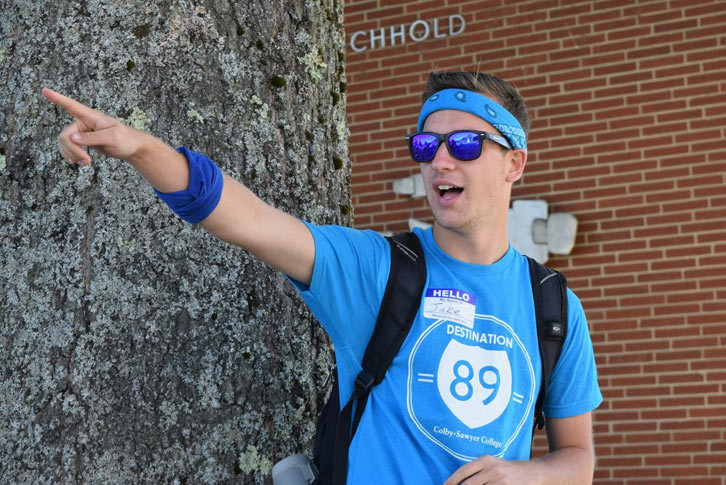When Emily Lopez ’17 and her mother started the college selection process during her junior year of high school, they had no idea that a small, private liberal arts-based college like Colby-Sawyer could be even more affordable than a public school because of generous institutional aid.
“We eventually found out that some private schools offer the most financial aid,” said Lopez, a first-generation student from Lincolnville, Maine, who has shattered multiple records on the cross country and track and field teams.
Though Lopez and her mother were nervous to apply to Colby-Sawyer because of its apparent cost, Lopez fell in love with the college while touring the campus. She took a leap of faith and applied. She was surprised when she started receiving financial aid packages and Colby-Sawyer offered the best option – better even than her state’s public schools.
Jakob Murtaugh ’18 of Salem, Mass., had a similar experience. Colby-Sawyer was the only private school to which he applied, and it offered him the best financial option.
“When we subtracted the financial aid packages from the total costs of the colleges we were looking at, Colby-Sawyer’s remainder turned out to be the lowest,” said Murtaugh. “That was a huge perk.” Murtaugh became an active member of the campus community as secretary of the Outing Club and a participant in student government and alternative spring break.

Lopez and Murtaugh are among the approximately 100 percent of full-time undergraduate students at Colby-Sawyer who receive institutional aid. The average amount awarded by the college is $30,446 per year. All told, the college invests more than $30 million a year in its own students to ensure their access to a Colby-Sawyer education.
Bridge to Colby-Sawyer
Colby-Sawyer rewards high school achievements in the form of generous academic scholarships based on an applicant’s GPA. These scholarships are renewable for up to four years.
Director of Financial Aid Beth Renzulli calls these scholarships the bridge to a Colby-Sawyer education.
“If you invested in yourself in high school, we value that,” said Renzulli. “These academic scholarships are the roadmap to making a Colby-Sawyer education attainable.”
Students who apply by the nonbinding early action deadline of Dec. 1 receive an additional financial award that is automatically renewed for up to four years.

Whatever a student’s background, Colby-Sawyer is committed to working with families to make sure they know about every opportunity to cover expenses. When Murtaugh’s financial situation changed, he met several times with Assistant Director of Financial Aid Brie Ito to walk through the process of updating his FASFA forms.
“At bigger schools, the process might be a bit more scripted,” said Murtaugh. “Here, the Office of Financial Aid really helped narrow down exactly what my family was going to get, how to get the most out of our financial aid package, and what to look for in loans.”
Lopez and Murtaugh’s financial aid processes were as personalized as their academic experiences in the Environmental Studies Department, which they appreciate. After graduating, Lopez is pursuing a career in law enforcement as a conservation officer. Murtaugh is interested in pursuing environmental consulting.
Part of Lopez’s Capstone was to work with high tunnels, which coincided with her community-based research project of expanding the college’s organic garden. She would also like to see the bike share proposal made in her community-based research project through to completion. Murtaugh wants to contribute to the continuation of the major’s hands-on projects and field studies. The two have big plans to invest in the college that invested in them and made their dreams possible.